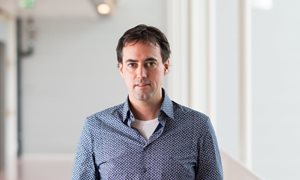
Erno Hermans has been appointed Professor of Cognitive Affective Neuroscience at the Radboud University Medical Center / Radboud University. He conducts research on stress and stress resilience. His aim is to unravel the effects of stress on the brain, and to use that knowledge to develop novel preventive interventions. These should prevent, rather than cure, stress-related disorders in the future.
How does our brain react in stressful situations? How do memories of such events form? And why do some people develop negative symptoms of stress while others do not? Erno Hermans (Oss, 1974) conducts research at the intersection of psychiatry and brain sciences. ‘I focus on the effect of stress on the brain, from immediate changes in brain function to long-term consequences of chronic stress,' says Hermans. 'My goal is to better understand, treat and prevent disorders related to stress.'
After studying Psychology, Hermans received his PhD in cognitive neuroscience from Utrecht University in 2006 for his thesis, titled: Defy or ally: neuroendocrine regulation of human socio-emotional behavior. After that he worked as a postdoc at the Donders Institute in Nijmegen. In 2010/2011 Hermans worked for a year at New York University. After his return, he started his own research group at the Department of Cognitive Neuroscience of the Radboudumc and the Donders Institute.
Staying mentally healthy
With his group, Hermans conducts research within the field of cognitive affective neuroscience. Hermans: 'We study how brain networks function during cognitive and affective processes. Cognitive refers to memory, thinking and control. Affective has to do with emotion and mood. This research is important because the interaction between these processes determines whether people remain mentally healthy when faced with stressful life experiences.'
Hermans combines different research methods to measure the effects of stress on the human brain. For example, he measures brain activity with functional MRI under different conditions. He also looks at the effects of certain medications on the brain. In addition, Hermans studies how people react to stress in real life, for example with wearables, such as smartwatches. In this way, he wants to unravel stress mechanisms in the brain.
More resilience
Ultimately, all this knowledge about the effects of stress on the brain should lead to interventions for increasing resilience and thereby preventing stress-related complaints. "It is difficult to treat health complaints related to stress, such as burnout" Hermans explains. 'That's why we are increasingly shifting from treating and developing new therapies, to increasing resilience and preventing people from developing complaints.'
Hermans has received major grants for his work, including NWO VENI (2007), ERC Consolidator (2016) and NWO VICI (2022). In addition, Hermans is a board member of the Stress-NL Foundation. He initiated this foundation in 2017, together with colleagues from different Dutch universities. Hermans: 'Stress-NL aims to bring together the interdisciplinary field of research on stress and psychopathology in the Netherlands.'
More information
Appointment for five years, as of 1 April 2022.
News item VICI-grant
Cognitive affective neuroscience lab
-
Want to know more about these subjects? Click on the buttons below for more news.
More information
Annemarie Eek

wetenschapsvoorlichter
Related news items





